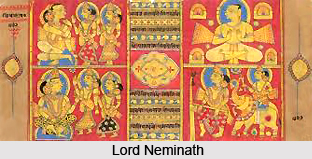 This Universe is made up of what Jains refer to as the six dravyas or substances which are the fundamental constituents of reality and are classified as follows:
This Universe is made up of what Jains refer to as the six dravyas or substances which are the fundamental constituents of reality and are classified as follows:
Jiva - The living substances
Jains believe that souls (J?va) exist as a reality, with a separate existence from the body that houses it. J?va is characterised by cetana (consciousness) and upayoga (knowledge and perception). Though the soul experiences both birth and death, it is neither really ruined nor created. Decay and origin refer respectively to the disappearing of one state of soul and appearance of another state, these being just the modes of the soul.
Ajava - Non-Living Substances
Pudgala - Matter - Matter is categorised as solid, liquid, gaseous, energy, fine Karmic materials and extra-fine matter or ultimate particles. Param?nu or ultimate particles are considered the basic unit of all matter. One of the qualities of Param?nu and Pudgala is that of permanence and indestructibility. It fluxes and changes its modes, but its basic qualities remain unchanged. According to Jainism, it cannot be created nor destroyed.
Dharma-tattva - Medium of Motion and Adharma-tattva - Medium of Rest - Also known as Dharmstikya and Adharmstikya, they are singular to Jain thought, portraying the principles of motion and rest. They are believed to penetrate the whole universe. Dharma-tattva and Adharma-tattva are by themselves not motion or rest, but mediate motion and rest in other bodies. Without dharm?stikya motion is not possible and without adharm?stikya rest is not possible in the universe.
Akasa - Space - Space is a substance that admits souls, matter, the principle of motion, the principle of rest, and time. It is all-pervading, infinite and made of uncounted space-points.
Kala - Time - Time is a material entity according to Jainism and all activities, changes or alterations can be accomplished only through time. In Jainism time is compared to a wheel with twelve spokes divided into descending and ascending halves with six stages, each of massive duration, approximated at billions of sagaropama or ocean years. According to Jains, sorrow increases at each progressive descending stage and happiness and bliss grow in each progressive ascending stage.
These are the un-created existing constituents of the Universe which lend the necessary dynamics to the Universe by interacting with each other. These constituents act according to the natural laws and their nature without interference from external entities. Dharma or true religion according to Jainism is vatthu sahvo dhammo translated as "the intrinsic nature of a substance is its true religion".



















